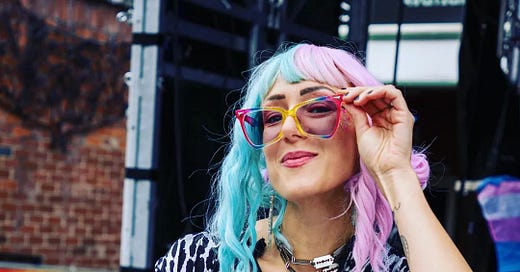It's been a hot minute since I wrote to you properly. My debut novel, Dear Neighbour, was published in June, and I got sucked into a whirlwind of shouting about it and then recovering. As part of that process, I even got to host my home Pride event, Stockport Pride, at the end of last month, a day that ended in torrential downpours but was no less beautiful for it. To be honest, there was something incredibly Mancunian about everyone dancing in the rain in their plastic ponchos that felt even more poignant than the glorious sunshine earlier that day.
Over these past few weeks, I've been grateful to be given the opportunity to talk to a few people about Dear Neighbour, including a couple of radio and podcast interviews. And as part of that conversation, I've started steeling myself for that inevitable question: so what's next? Meaning: what are you writing, what are you working on, when's your next book coming out? And the thing is, I haven't got the answer. I mean, I've got answers I can stitch together and make sound sincere. Some of it's even the truth. I am writing, though what form that writing will eventually be and what it's about are far more tangled things for me to be able to unravel just yet. And to be honest, for now I want this part of the process to be just for me. I don't want to give those answers. But more than that: I'm starting to feel that these aren't even the right questions.





Hear hear. Embracing a loss of control, or rejecting the obligation to be in control, sounds like a good starting place for creative work, and maybe (scary as it sounds) life in general. Thanks Jane. This was a great way to start (well, continue as I was up far too early) my day. 😀
While I realize you’re writing about writing in this essay (at least in part, while also contextualizing writing and art within a larger whole), your words about control resonate powerfully with my recovery from anorexia and my ongoing addiction to over-work, ocd patterning, etc. Thank you.
And here’s to upending whatever it is that we call success and failure and what’s next and expected.